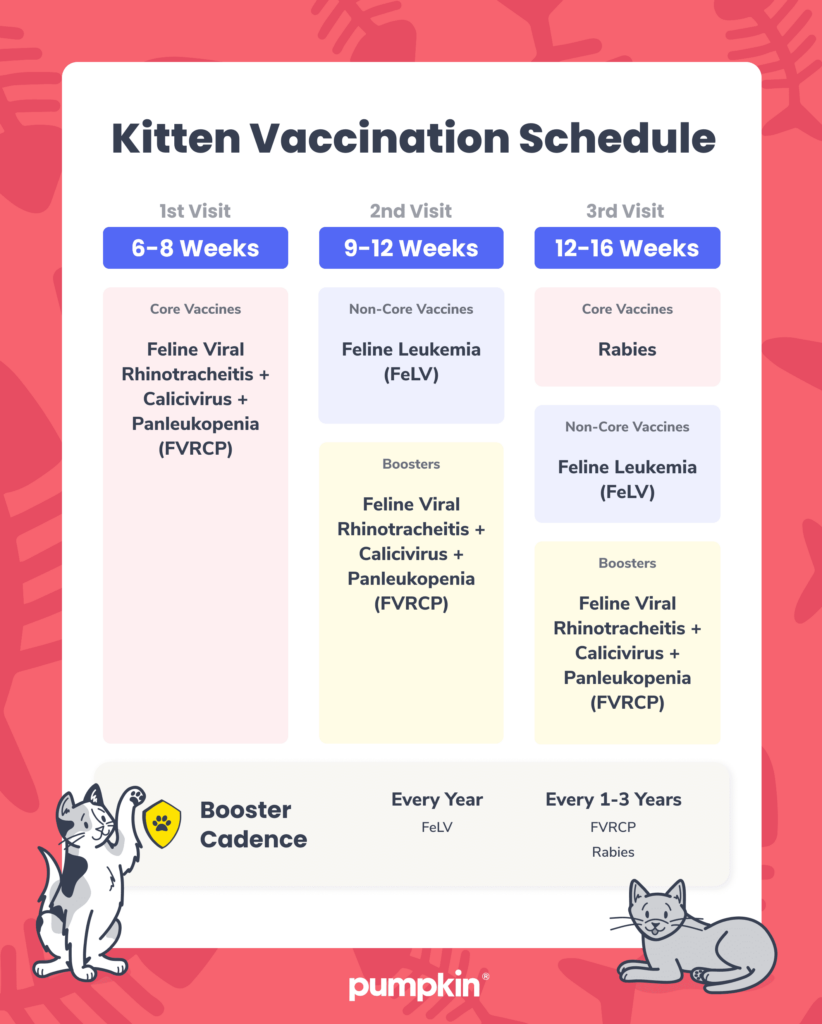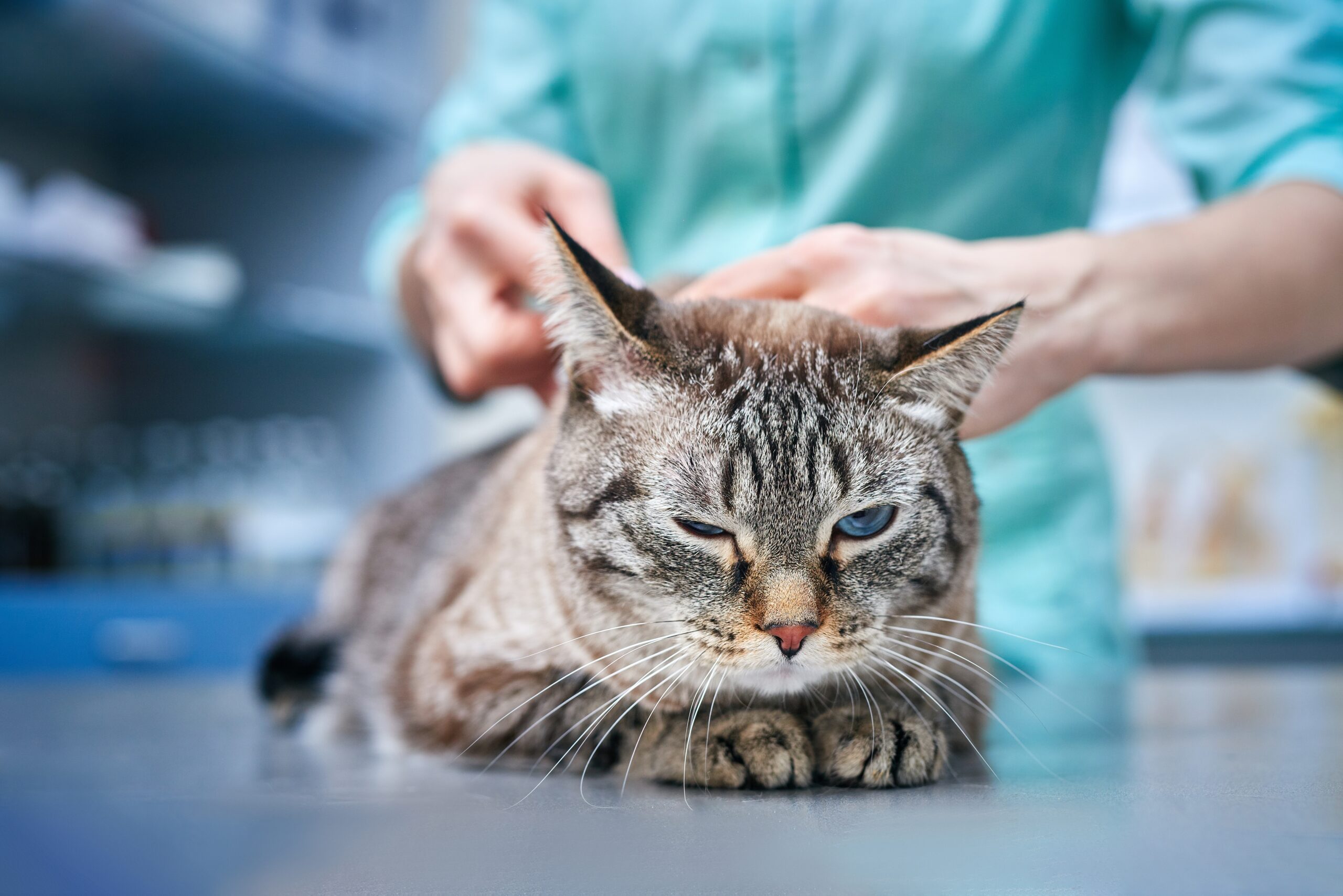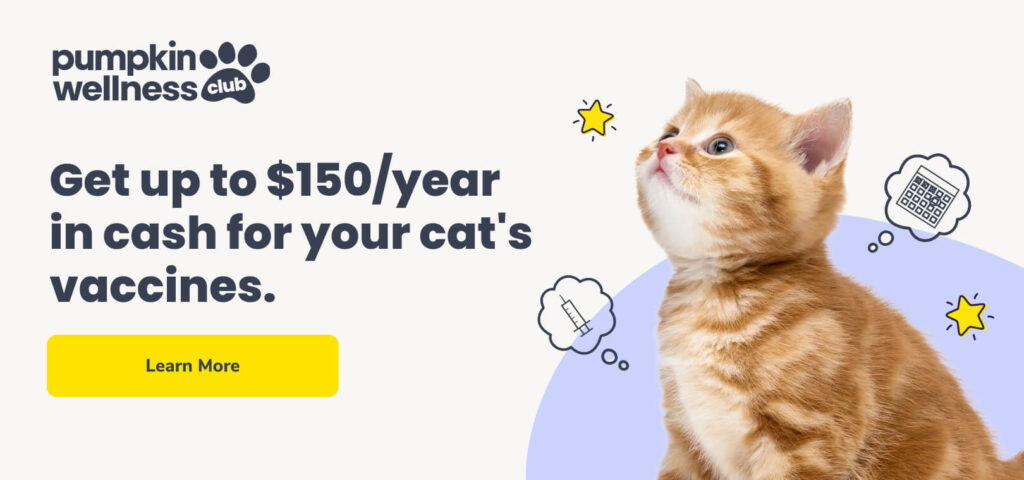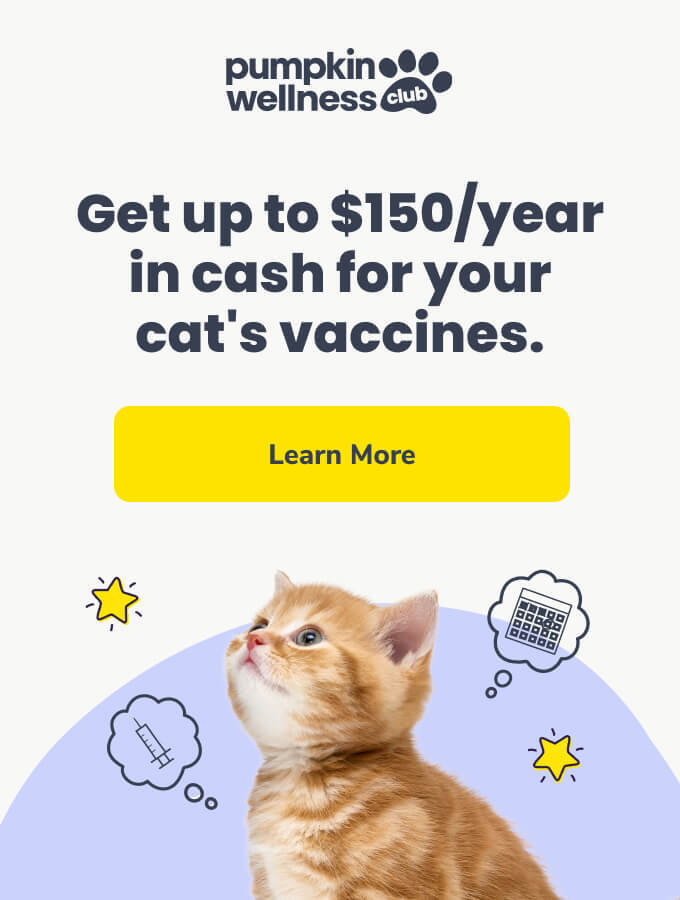Key Points
- Vaccinating your cat can be expensive, but it’s a vital part of protecting your fur friend’s health throughout their lifetime.
- The FVRCP vaccination delivers three core cat vaccines in one shot, and typically costs $20-40 per dose.
- Depending on their lifestyle, your cat may also need vaccines for feline leukemia (FeLV) and feline immunodeficiency virus (FIV). These can cost up to $50 a shot.
- Pumpkin Wellness Club members can save up to $390 per year on preventive care for cats, including routine vaccinations, annual wellness visits, fecal testing, and access to discounts on top pet products.*
So, you’ve adopted a cat and are just now thinking about vet visits. Getting a cat can bring so much joy and companionship into your life, but along with the cuddles and cuteness comes the responsibility of keeping them healthy.
Vaccines are an essential part of preventive care for cats, as they provide protection from serious diseases. You’ll also need to visit a veterinarian for advice on your new cat’s diet, dental care, and parasite prevention while you’re at it.
But how much should you budget for your cat’s vaccines? The answer isn’t as simple as a one-size-fits-all number. Factors like your location, the type of vaccines, and whether your cat is a sprightly kitten or an aging senior can all influence the final price tag. You can also get paid up to $150 for your cat’s annual vaccinations with the Pumpkin Wellness Club, a new program designed to help you save on the costs of pet preventive care.
Before you start imagining a hefty vet bill, let’s dive into how much cat vaccines actually cost.
How much do cat vaccines cost?
The following table shows the cost of the vaccines your cat or kitten may need in a given year. Core vaccines, such as the 3-in-1 FVRCP shot or rabies, are strongly recommended for all cats and in some cases, legally required.
| Core vaccines | Estimated cost |
| FVRCP | $20-40 per dose |
| Feline Leukemia Virus (FeLV) | $25-45 per dose |
| Rabies | $20-30 per dose |
| Non-core vaccines | Estimated cost |
| Bordetella | $10-30 per dose |
| Chlamydia felis | $20-40 per dose |
The FVRCP vaccine protects against three common, highly infectious viruses that can make your cat extremely sick: feline herpesvirus (FHV-1), feline calicivirus (FCV), and feline panleukopenia (FPV). The FeLV vaccine is also a part of the AAHA-recommended core vaccination series, and is especially important for kittens.
Rabies vaccines are required by law for new kittens in most states, as the bite of an infected animal can transmit the disease to humans and other animals via saliva. The disease is ultimately fatal, so this isn’t one to skip.
Your veterinarian may recommend the Bordetella and Chlamydia felis vaccines if you plan to board your cat in a cattery or take them to a groomer. You can trust that your vet knows best, and clinics often bundle the cost of core vaccines along with the regular visit fee.
Factors affecting cat vaccine costs
The cost of cat vaccines will vary slightly depending on a few factors. Prices may differ between rural and urban areas, or between different states. The veterinary clinic you choose may bundle core vaccines for cats, saving you a few bucks, or could include an office visit fee in the overall cost.
If you’re bringing in your kitten for a first-time visit, you can also expect to pay for other preventive services like fecal testing and blood testing to screen for common infections. It’s important to establish a healthy baseline and ensure that your kitty doesn’t have any of the diseases that can be prevented with routine vet care.
Regardless of where you get your cat vaccinated, the cost per vaccine won’t vary more than around ten dollars. And the value of protecting your cat’s health is priceless no matter where you live.
How often does my cat need to get vaccinated?
As you’re doing the mental vaccine math, keep in mind that kittens need multiple doses of the core vaccines during their first year of life.
The recommended vaccination schedule for FVRCP includes three doses at 8, 12, and 16 weeks of age, followed by boosters every one to three years to ensure protection against infectious diseases.
If they have never received it before, your cat will also need two doses of the FeLV vaccine, which can be given to kittens along with the FVRCP series at 8 and 12 weeks. You can start your cat’s FeLV shots at any point after 8 weeks of age, but it’s especially important protection for kittens. If your adult cat doesn’t ever go outside, you may elect to discontinue the vaccine as an adult. If your adult cat goes outside or is groomed or boarded, it is a good idea to continue with an annual immunization against FeLV.
Kittens only need one dose of the rabies vaccine in their first year, usually given at 16 weeks. Booster shots are required for adult cats every one to three years, depending on the type of vaccine.
If you adopt a kitten after 16 weeks, check with the shelter or foster to make sure they got their initial shots. You may have to complete the series of core vaccinations — or if you’ve been chosen by the cat distribution system, start at square one with a vet visit.

What vaccines do cats need?
Your cat’s vaccination schedule depends on their overall health and risk of exposure: outdoor cats are more likely to come into contact with infectious diseases. Cats who spend time in boarding facilities, go to cat shows, or live in multi-pet households also have a higher risk for infections such as Bordetella.
Core vaccines for cats
Every cat should be vaccinated against the following diseases:
- Feline Herpesvirus (FHV-1): This virus causes upper respiratory infections in cats, leading to sneezing, coughing, and eye discharge. Also known as feline viral rhinotracheitis.
- Feline Calicivirus (FCV): Similar to FHV-1, FCV also causes respiratory infections in cats.
- Feline Panleukopenia (FPV): Also known as feline distemper, FPV is a highly contagious viral disease that can be fatal.
- Feline Leukemia (FeLV): This virus attacks the cat’s immune system, and can lead to persistent and ultimately fatal infections.
- Some veterinarians consider FeLV a core vaccine for kittens, while others consider it non-core or a lifestyle vaccine depending on your cat’s risk.
- Rabies: A fatal viral disease transmitted through the saliva of infected animals, rabies can affect both humans and animals.
One single vaccine, known as the FVRCP vaccine, protects against three illnesses: feline herpesvirus, feline calicivirus, and feline panleukopenia virus. Your cat needs separate vaccines for rabies and feline leukemia.
Non-core vaccines for cats
If your cat spends time outdoors or stays at a boarding facility when you go on vacation, ask your vet about the following non-core vaccines:
- Chlamydia felis: A bacterial infection that causes conjunctivitis and respiratory symptoms.
- Bordetella bronchiseptica (Kennel Cough): A bacterial infection that causes coughing and respiratory distress.
- Feline Immunodeficiency Virus (FIV): A virus that weakens the cat’s immune system, making them more susceptible to infections. This vaccine is not widely used by veterinarians, as it has variable efficacy.
Other costs associated with cat vaccines
Vaccinations are just the beginning of caring for your cat or kitten. You’ll need to find a trusted vet who can help with other preventive care your cat needs, like screening for diseases and maintaining a healthy diet.
Feline immunodeficiency virus (FIV) compromises the immune system, increasing the risk of serious infections. Unfortunately, no vaccine is effective against all FIV strains. During your kitten’s first vet visit, your veterinarian may recommend testing for FeLV and FIV at the same time. This costs anywhere from $40 to $80.
The veterinarian will also recommend a fecal test to screen for intestinal parasites, which usually costs between $20 and $40. If that test comes back positive, deworming costs an additional $25 to $130. As for fleas, ticks, and heartworms, ask your vet if your cat needs protection against these common pests. (If your cat spends time outside or around other animals, the answer is likely yes.)
Pumpkin knows that preventive care is important, but it can also be pricey. That’s why the Pumpkin Wellness Club can help you save up to $390 on routine wellness care like vaccinations, dental cleanings, and discounts on top pet products.
DISCLOSURE





